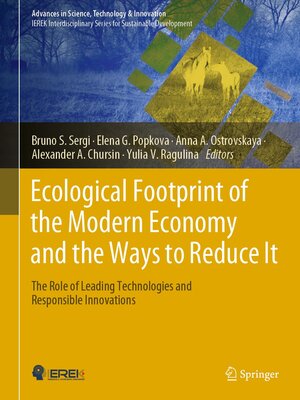Ecological Footprint of the Modern Economy and the Ways to Reduce It
ebook ∣ The Role of Leading Technologies and Responsible Innovations · Advances in Science, Technology & Innovation
By Bruno S. Sergi

Sign up to save your library
With an OverDrive account, you can save your favorite libraries for at-a-glance information about availability. Find out more about OverDrive accounts.
Find this title in Libby, the library reading app by OverDrive.



Search for a digital library with this title
Title found at these libraries:
| Library Name | Distance |
|---|---|
| Loading... |
This book is devoted to the systems rethinking of the role of the leading digital technologies and circular innovations to reduce the environmental footprint of the modern economy. The target audience of this book consists of scientists who explore environmental economics, energy economics, and sustainable development. In this book, they will find a consistent take on the impact of the economy on the environment from the perspective of a new scientific concept—the environmental footprint of the economy, described through the lens of the UN SDGs. This book is also useful for public agencies of energy and environmental economics and environmentally responsible enterprises. In this book, they will find applied recommendations on improving the efficiency of the use of high technologies and responsible innovations to reduce the environmental footprint of the modern economy.
The book provides numerous real-world examples, case studies, and recommendations on unlocking the environmental potential of high technologies (Big Data, Ubiquitous Computing (UC), Robotics, Artificial Intelligence (AI), and the Internet of Things (IoT)) and responsible innovations (ESG investments, environmental taxation, green jobs), which allow reaching net-zero emission and building a carbon-neutral circular economy. The interest in this book is also attributable to the fact that it takes into account the specifics of developed and less-developed countries. The book puts more focus on the real-life and case experience of Central Asia and the Eurasian Economic Union (EAEU).







